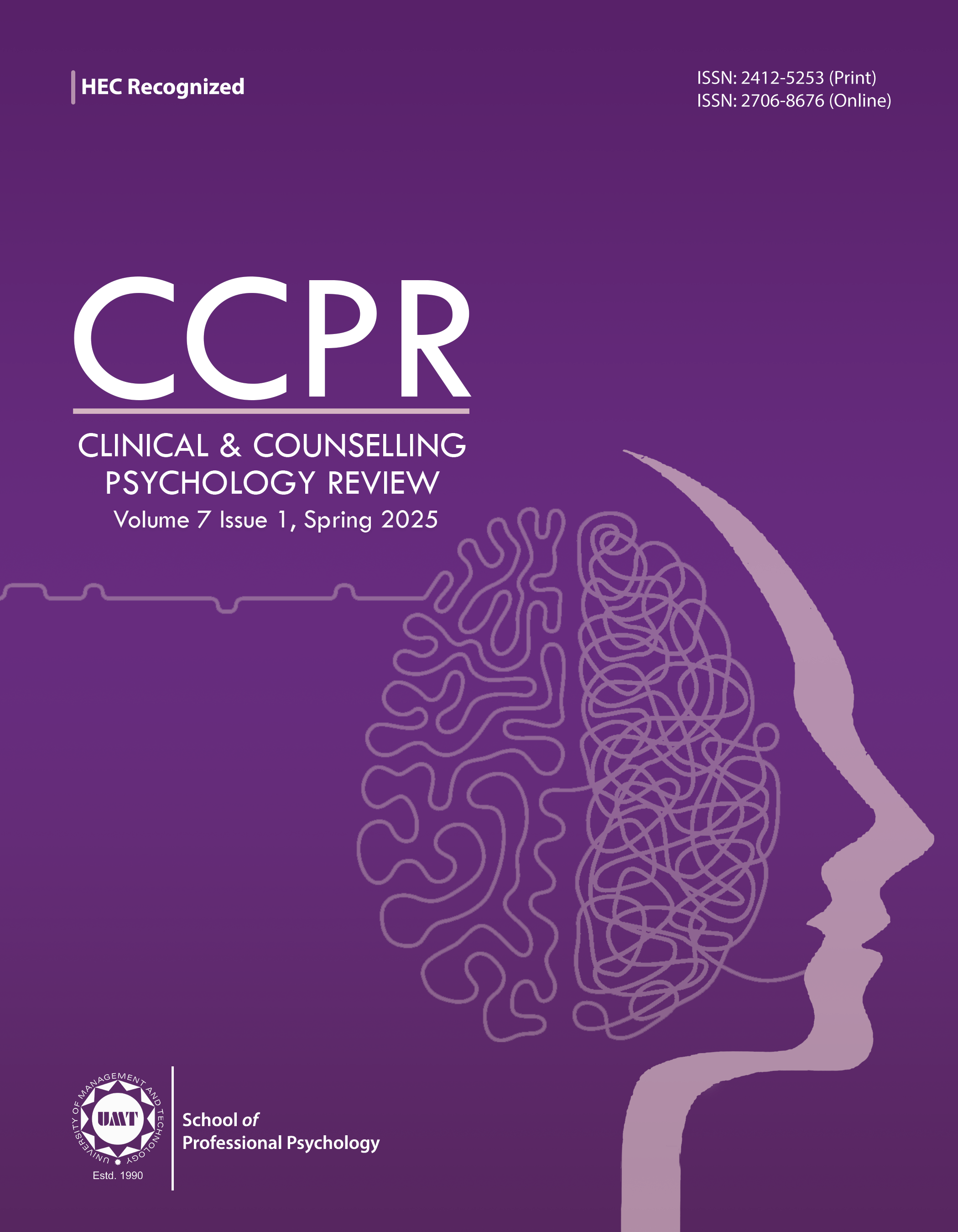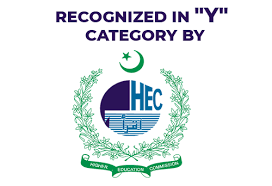Cognitive Difficulties, Mental Fatigue and Psychological Well-being of Women with Polycystic Ovary Syndrome
Abstract
 Abstract Views: 0
Abstract Views: 0
Polycystic ovary syndrome (PCOS) is a common health issue in 52 percent of Pakistani women and linked with cognitive impairments and mental fatigue, but its psychological consequences have not been studied in-depth. This research seeks to investigate the connection between cognitive difficulties, mental fatigue and psychological wellbeing among PCOS women, to gain more insight into the psychological effect of the syndrome, and to guide its interventions that could improve their psychological health. A sample of 60 women aged 18-45 years was selected out of PCOS diagnosed women in both the private and public hospitals in Punjab, Pakistan. The research tools used in the study were as follows; Demographic Questionnaire, Cognitive Failure Questionnaire, Mental Fatigue Scale and Ryff’s Psychological Well Being Urdu Scale. The correlational analysis found that, both mental fatigue and cognitive difficulties had negative correlations with psychological well-being. Regression analysis also indicated that poor psychological wellbeing among the PCOS women was largely predicted by mental fatigue. In this study, it is demonstrated that lower degree of psychological wellbeing is related to the presence of cognitive difficulties and mental fatigue in women with PCOS, and such a result is predicted by mental fatigue to the greatest extent.
Downloads
References
Abdollahi, L., Mirghafourvand, M., Babapour, J. K., & Mohammadi, M. (2018). Effectiveness of cognitive-behavioral therapy (CBT) in improving the quality of life and psychological fatigue in women with polycystic ovarian syndrome: A randomized controlled clinical trial. Journal of Psychosomatic Obstetrics & Gynecology, 40(4), 283–293. https://doi.org/10.1080/0167482x.2018.1502265
Acquadro, C., Conway, K., Hareendran, A., & Aaronson, N. (2008). Literature review of methods to translate health-related quality of life questionnaires for use in multinational clinical trials. Value in Health, 11(3), 509–521. https://doi.org/10.1111/j.1524-4733.2007.00292.x
Ahmad, I., Khalily, M. T., & Hallahan, B. (2017). Reasons associated with treatment non-adherence in schizophrenia in a Pakistan cohort. Asian Journal of Psychiatry, 30, 39–43. https://doi.org/10.1016/j.ajp.2017.07.024
Akram, M., & Roohi, N. (2015). Endocrine correlates of polycystic ovary syndrome in Pakistani women. Journal of the College of Physicians and Surgeons Pakistan, 25(1), 22–26. https://pubmed.ncbi.nlm.nih.gov/25604364
Amiri, F. N., Tehrani, F. R., Simbar, M., Thamtan, R. A. M., & Shiva, N. (2014). Female gender scheme is disturbed by polycystic ovary syndrome: A qualitative study from Iran. Iranian Red Crescent Medical Journal, 16(2), Article e12423. https://doi.org/10.5812/ircmj.12423
Atif, N., Lovell, K., Husain, N., Sikander, S., Patel, V., & Rahman, A. (2016). Barefoot therapists: Barriers and facilitators to delivering maternal mental health care through peer volunteers in Pakistan: A qualitative study. International Journal of Mental Health Systems, 10(1), Article e5. https://doi.org/10.1186/s13033-016-0055-9
Bajpai, A., & Sharma, D. (2025). Psychological distress and fatigue in polycystic ovarian syndrome: A pilot study. Journal of Human Reproductive Sciences, 18(1), Article e25. https://doi.org/10.4103/jhrs.jhrs_25_25
Barnard, L., Ferriday, D., Guenther, N., Strauss, B., Balen, A., & Dye, L. (2007). Quality of life and psychological well-being in polycystic ovary syndrome. Human Reproduction, 22(8), 2279–2286. https://doi.org/10.1093/humrep/dem108
Baumeister, R. F., Bratslavsky, E., Muraven, M., & Tice, D. M. (1998). Ego depletion: Is the active self a limited resource? Journal of Personality and Social Psychology, 74(5), 1252–1265. https://doi.org/10.1037/0022-3514.74.5.1252
Boksem, M. A., & Tops, M. (2008). Mental fatigue: Costs and benefits. Brain Research Reviews, 59(1), 125–139. https://doi.org/10.1016/j.brainresrev.2008.07.001
Boksem, M. A., Meijman, T. F., & Lorist, M. M. (2005a). Effects of mental fatigue on attention: An ERP study. Cognitive Brain Research, 25(1), 107–116. https://doi.org/10.1016/j.cogbrainres.2005.04.011
Boksem, M. A., Meijman, T. F., & Lorist, M. M. (2005b). Mental fatigue, motivation and action monitoring. Biological Psychology, 72(2), 123–132. https://doi.org/10.1016/j.biopsycho.2005.08.007
Broadbent, D. E., Cooper, P. F., FitzGerald, P., & Parkes, K. R. (1982). The Cognitive Failures Questionnaire (CFQ) and its correlates. British Journal of Clinical Psychology, 21(1), 1–16. https://doi.org/10.1111/j.2044-8260.1982.tb01421.x
Causier, C., Johns, L., Radez, J., Hassan, H., Maughan, D., & Waite, F. (2024). Experiences of help-seeking for severe mental health problems in young Pakistani women: A preliminary qualitative study. Journal of Cross-Cultural Psychology, 55(4), 429–443. https://doi.org/10.1177/00220221241236944
Chopra, S., Zehrung, R., Shanmugam, T. A., & Choe, E. K. (2021, May 8–13). Living with uncertainty and stigma: Self-experimentation and support-seeking around polycystic ovary syndrome [Paper presentation]. Proceedings of the 2021 CHI Conference on Human Factors in Computing Systems, New York, United States.
Dhanabhakyam, M., & Sarath, M. (2023). Psychological wellbeing: A systematic literature review. International Journal of Advanced Research in Science Communication and Technology, 3, 603–607. https://doi.org/10.48175/ijarsct-8345
Gates, N., Valenzuela, M., Sachdev, P., & Singh, F. (2014). Psychological well-being in individuals with mild cognitive impairment. Clinical Interventions in Aging, 9, 779–792. https://doi.org/10.2147/cia.s58866
Gavelin, H. M., Neely, A. S., Dunås, T., Eskilsson, T., Järvholm, L. S., & Boraxbekk, C. (2020). Mental fatigue in stress-related exhaustion disorder: Structural brain correlates, clinical characteristics and relations with cognitive functioning. NeuroImage: Clinical, 27, Article e102337. https://doi.org/10.1016/j.nicl.2020.102337
Hsu, H., & Bai, C. (2022). Individual and environmental factors associated with cognitive function in older people: A longitudinal multilevel analysis. BMC Geriatrics, 22(1), Article e311. https://doi.org/10.1186/s12877-022-02940-9
Huddleston, H. G., Jaswa, E. G., Casaletto, K. B., Neuhaus, J., Kim, C., Wellons, M., Launer, L. J., & Yaffe, K. (2024). Associations of polycystic ovary syndrome with indicators of brain health at midlife in the CARDIA cohort. Neurology, 102(4), Article e8104. https://doi.org/10.1212/wnl.0000000000208104
Ibáñez, L., Oberfield, S. E., Witchel, S., Auchus, R. J., Chang, R. J., Codner, E., Dabadghao, P., Darendeliler, F., Elbarbary, N. S., Gambineri, A., Rudaz, C. G., Hoeger, K. M., López-Bermejo, A., Ong, K., Peña, A. S., Reinehr, T., Santoro, N., Tena-Sempere, M., Tao, R., … Lee, P. A. (2017). An international consortium update: Pathophysiology, diagnosis, and treatment of polycystic ovarian syndrome in adolescence. Hormone Research in Paediatrics, 88(6), 371–395. https://doi.org/10.1159/000479371
Iraldo, T. (2024). Mental fatigue and sleep: Exploring the bidirectional relationship. Allied Academies Journal of Clinical Neurology, 7(3), Article e214. https://doi.org/10.35841/aacnj-7.3.214
Javed, M. A., Ahsan, W., Khattak, U. K., & Afzal, S. (2024). Stigma associated with seeking psychiatric care among the general population of Islamabad, Pakistan. Pakistan Journal of Public Health, 14(1), 33–37. https://doi.org/10.32413/pjph.v14i1.1197
Jibeen, T., & Khalid, R. (2012). Cross validation of Ryff's scales of psychological well-being: Translation into Urdu language. The International Journal of Educational and Psychological Assessment, 10(2), 35–51.
Johansson, B., Berglund, P., & Rönnbäck, L. (2009). Mental fatigue and impaired information processing after mild and moderate traumatic brain injury. Brain Injury, 23(13-14), 1027-1040. https://doi.org/10.3109/02699050903421099
Johansson, B., & Ronnback, L. (2014). Evaluation of the mental fatigue scale and its relation to cognitive and emotional functioning after traumatic brain injury or stroke. International Journal of Physical Medicine & Rehabilitation, 2(1), 1–7.
Karademas, E. C., Simos, P., Zaganas, I., Tziraki, S., Panagiotakis, S., Basta, M., & Vgontzas, A. N. (2019). The impact of mild cognitive impairment on the self-regulation process: A comparison study of persons with mild cognitive impairment and cognitively healthy older adults. Journal of Health Psychology, 24(3), 351–361. https://doi.org/10.1177/1359105316674270
Khan, K., Tariq, N. U. S., & Majeed, S. (2024). Psychological impact of medical gaslighting on women: A systematic review. Journal of Professional & Applied Psychology, 5(1), 110–125. https://doi.org/10.52053/jpap.v5i1.249
Khan, M. A., Jafree, S. R., & Jibeen, T. (2020). Social barriers to mental well-being in women of South Asia. In M. M. Cornelio (Ed.), Women’s mental health: Resistance and resilience across cultures (pp. 129–150). Springer. https://doi.org/10.1007/978-3-030-50204-1_7
Lazarus, R. S., & Folkman, S. (1984). Stress, appraisal, and coping. Springer Publishing Company.
Lin, L., Wang, S., Xu, W., Hu, Q., Zhang, P., Ke, Y., Huang, J., Ding, K., Li, X., Hou, C., & Jia, F. (2022). Subjective cognitive decline symptoms and their association with socio-demographic characteristics and common chronic diseases in southern Chinese older adults. BMC Public Health, 22(1), Article e12522. https://doi.org/10.1186/s12889-022-12522-4
Mirza, I., Tareen, A., Davidson, L. L., & Rahman, A. (2009). Community management of intellectual disabilities in Pakistan: A mixed methods study. Journal of Intellectual Disability Research, 53(6), 559–570. https://doi.org/10.1111/j.1365-2788.2009.01176.x
Mirza, Z. (2024, November 29). Women’s health. Dawn News. https://www.dawn.com/news/1875481
Naeem, F., Habib, N., Gul, M., Khalid, M., Saeed, S., Farooq, S., Munshi, T., Gobbi, M., Husain, N., Ayub, M., & Kingdon, D. (2014). A qualitative study to explore patients’, carers’ and health professionals’ views to culturally adapt CBT for psychosis (CBTp) in Pakistan. Behavioural and Cognitive Psychotherapy, 44(1), 43–55. https://doi.org/10.1017/s1352465814000332
Rajkumar, E., Ardra, A., Prabhu, G., Pandey, V., Sundaramoorthy, J., Manzoor, R., Sooraj, K., Manikandaprabu, M., & Badiger, T. (2022). Polycystic ovary syndrome: An exploration of unmarried women’s knowledge and attitudes. Heliyon, 8(7), Article e09835. https://doi.org/10.1016/j.heliyon.2022.e09835
Ranabir, S., & Reetu, K. (2011). Stress and hormones. Indian Journal of Endocrinology and Metabolism, 15(1), 18–22. https://doi.org/10.4103/2230-8210.77573
Responsive Translation. (n.d.). MAPI validation for clinical trial translation. Retrieved July 22, 2024, from https://www.responsivetranslation.com/clinical-trial-translation/mapi-validation-clinical-trial-translation/
Rizwan, F. (1969). Frequency and outcome of treatment in polycystic ovaries related infertility. Pakistan Journal of Medical Sciences, 31(3), Article e8003. https://doi.org/10.12669/pjms.313.8003
Ryff, C. D. (2013). Psychological well-being revisited: Advances in the science and practice of eudaimonia. Psychotherapy and Psychosomatics, 83(1), 10–28. https://doi.org/10.1159/000353263
Seabrook, S. (2024). Bleed: Destroying myths and misogyny in endometriosis care by Tracey Lindeman. International Journal of Feminist Approaches to Bioethics, 17(2), 181–185. https://doi.org/10.3138/ijfab.17.2.13
Shukla, A., Rasquin, L. I., & Anastasopoulou, C. (2025, May 4). Polycystic ovarian syndrome. StatPearls Publishing. https://www.ncbi.nlm.nih.gov/books/NBK459251/
Sweller, J. (1988). Cognitive load during problem solving: Effects on learning. Cognitive Science, 12(2), 257–285. https://doi.org/10.1207/s15516709cog1202_4
Tabassum, A., Sadia, R., & Khan, S. (2023). Impact of infertility-related stress and family and social support on marital satisfaction of infertile individuals. International Journal of Psychological and Behavioural Research, 3(1), 50–73. https://doi.org/10.37605/ijpbr.v3i1.32
Tariq, R., Mahmood, Q. K., & Omer, S. (2024). The experiences and challenges faced by women with polycystic ovary syndrome (PCOS) in Lahore, Pakistan. Contemporary Issues in Social Sciences and Management Practices, 3(3), Article e218. https://doi.org/10.61503/cissmp.v3i3.218
Teede, H., Deeks, A., & Moran, L. (2010). Polycystic ovary syndrome: A complex condition with psychological, reproductive and metabolic manifestations that impacts on health across the lifespan. BMC Medicine, 8(1), Article e41. https://doi.org/10.1186/1741-7015-8-41
van der Linden, D., Frese, M., & Meijman, T. F. (2003). Mental fatigue and the control of cognitive processes: Effects on perseveration and planning. Acta Psychologica, 113(1), 45–65. https://doi.org/10.1016/S0001-6918(02)00150-6
Walkiewicz, M., Zdun-Ryżewska, A., Budziński, W., Tartas, M., & Błażek, M. (2023). Fatigue and the psychological characteristics of medical students. International Journal of Occupational Medicine and Environmental Health, 36(4), 517–525. https://doi.org/10.13075/ijomeh.1896.02116
Witchel, S. F., Oberfield, S. E., & Peña, A. S. (2019). Polycystic ovary syndrome: Pathophysiology, presentation, and treatment with emphasis on adolescent girls. Journal of the Endocrine Society, 3(8), 1545–1573. https://doi.org/10.1210/js.2019-00078
World Health Organization. (2025, February 7). Polycystic ovary syndrome. https://www.who.int/news-room/fact-sheets/detail/polycystic-ovary-syndrome
Yuen, E. Y., Wei, J., Liu, W., Zhong, P., Li, X., & Yan, Z. (2012). Repeated stress causes cognitive impairment by suppressing glutamate receptor expression and function in prefrontal cortex. Neuron, 73(5), 962–977. https://doi.org/10.1016/j.neuron.2011.12.033








